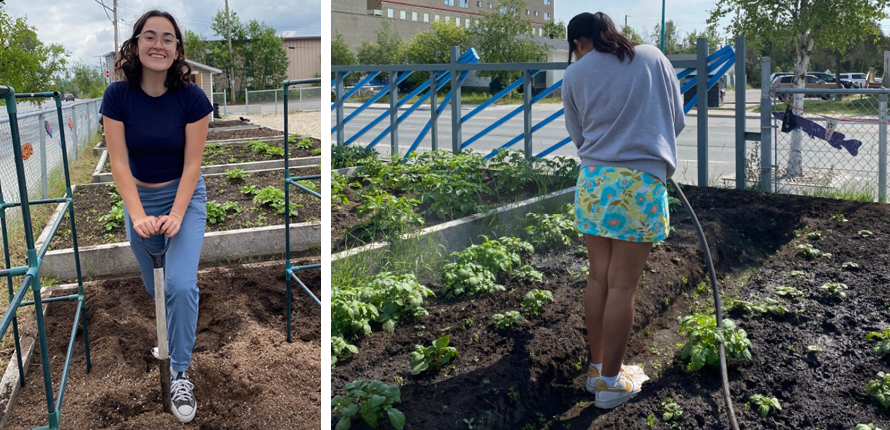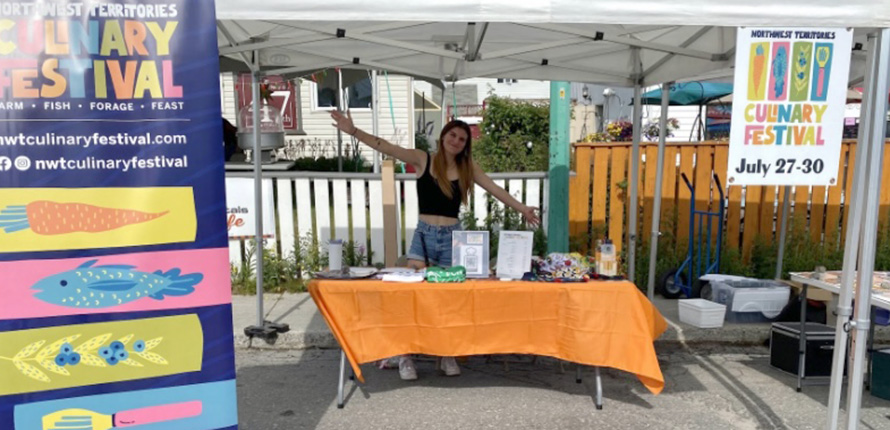We use cookies on this site to enhance your experience.
By selecting “Accept” and continuing to use this website, you consent to the use of cookies.
Search for academic programs, residence, tours and events and more.
Feb. 29, 2024
Print | PDFWhen Linnea Azzolini ate fresh tomatoes from her grandmother’s garden in Kingston, Ont., she couldn’t believe how much better they tasted than the tomatoes available at her local grocery store in Yellowknife, N.W.T. Food options are limited in the North due to challenging agricultural conditions and the cost of transportation can make grocery bills prohibitively expensive. Azzolini wondered if there were ways to make locally grown food accessible and affordable for members of her community.
Rather than simply pondering those ideas, Azzolini has become an agent of change. During the summer of 2023, she returned to her hometown after completing her first year of undergraduate study at Wilfrid Laurier University in Waterloo, Ont. ready to make a difference. Azzolini worked with long-time Laurier research partner Ecology North to promote local food security initiatives. She helped care for community gardens, educated kids at day camps and organized the Northwest Territories Culinary Festival.
Northern food security is a key focus for Laurier researchers, championed by the UNESCO Chair on Food, Biodiversity and Sustainability Studies. At the Laurier Centre for Sustainable Food Systems, the Northern Food Systems Research Group engages researchers, local practitioners and students, like Azzolini, in community-led projects to build more resilient food systems.
Azzolini says her summer was filled with “wonderful experiences,” despite being cut short by the Northwest Territories’ historic wildfire season. Below, she reflects on what she learned and why she is so passionate about sustainability.
There are no better people to learn from than Indigenous peoples who have been here for thousands of years. I’m eager to learn more about traditional ways of living and highlight their importance in relation to the environmental issues we are faced with today.
I learned from a wonderful woman named Lona who knows everything there is to know about gardening in the North. I was basically in charge of taking care of the gardens – watering them, weeding them. Children would join us to learn about different vegetables and how to plant them. Then they got to eat the vegetables they planted at the end of the summer.
I loved seeing how excited and interested the kids were. These programs weren’t available when I was growing up in Yellowknife, so it’s great to see Ecology North creating a foundation for the future. These kids will grow up to be adults and plant gardens of their own.

Interns who worked alongside Azzolini to maintain community gardens
Food prices in Yellowknife are very high and you wind up eating so many processed foods. When you know how to produce your own food, you can save so much money. And it cuts down on the carbon emissions created to transport food all the way to Yellowknife, which is huge. On a larger scale, I was fascinated to learn about the local economy for northern growers and producers. I realized that, although costly, it is possible to have an agriculture sector in the North. All we need is more investment.
It was a four-day festival hosted by the Territorial Agrifood Association and the goal was to showcase local chefs, mixologists and food producers. Some of these folks are making their products, like hot sauces, out of their homes and don’t get much recognition or opportunity to sell them beyond the local farmers market.
I was in charge of the sustainability plan for the festival, ensuring there were composting, recycling and garbage facilities. I also helped with other tasks, like reaching out to musicians. As someone who has never planned anything before, it was a massive learning curve. But it was super fun and I met so many interesting people from the community.

Azzolini at the Northwest Territories Culinary Festival
I learned how to take on a leadership role. At the beginning of the festival, volunteers and chefs were asking me questions and I didn’t feel like I was in a position to answer them. By the end of the festival, I was telling people where to go and what to do. It helped me be more assertive and comfortable using my voice. I feel more confident in myself and my decision-making capabilities.
It felt apocalyptic. Leading up to the evacuation, we were all just going to work and wondering, “Why are we here right now? What are we doing?” It was very scary. Eventually I had to wear a face mask while working in the gardens because the smoke made it so hard to breathe.
Leaving the city was a bit traumatizing because your home is in danger and there’s nothing you can do about it. You just have to get up and go. My mom and I drove to Alberta, then eventually flew to Kingston. We felt like sitting ducks for two and a half weeks, waiting for news that it was safe to return.
It felt great to be able to start exploring different realms of work in the environmental field, this one being mainly focused on food security and sustainability. Having my first experience was super motivating and it will continue to motivate my learning throughout the school year because I’ve seen how implementing new social programs can change people’s mindsets.